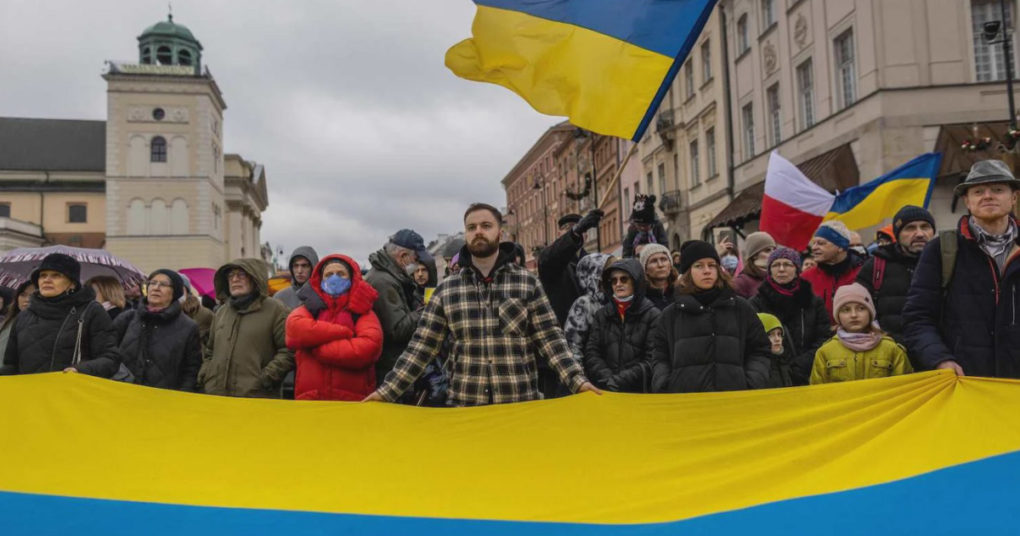The current geo-political turmoil, with Ukraine in the eye of the storm, is upsetting all kinds of certainties and semi-certainties. Many of these we may have been priding ourselves of possessing. One is the semi-certainty, held by perhaps a majority of Christians, that on the political spectrum their values were going to be better protected by the right as opposed to the left. This was so much so that in current discourse “the Christian right” itself became a political category.
Now, however, a great deal of rethinking has been forced on the lazy-minded categorisers. This has been forced on all who place value on religion itself, of any denomination or creed. A genuine orthodox Christian has no choice but to flee from the murderous political regime which until very recently was being seen as a defender of the faith. That title has now become as unworthy of Vladimir V. Putin as the title defensor fidei bestowed on Henry VIII by Pope Leo X in 1521 became. In the Islamic world the brutalities of Iran and Saudi Arabia, so-called defenders of the Muslim faith, can only be an affront to its genuine adherents. The growing extremism of Narenda Modi’s regime must pain any peace-loving Hindu.
But the cleansing process does not end with the potential it has for the purification of religions. It also shows signs of bringing the secular world back to its senses. Ezra Klein, a young liberal-minded columnist in the New York Times suggests that the exposure of the excesses of the right now gives liberalism itself an opportunity to bring itself back from the brink of disaster, a scenario outlined a few years ago by Patrick Deneen of Notre Dame in his book on the failure of liberalism. Its intolerances and narrow minded bigotry has been for years threatening what Klein sees as its true universal spirit.
In Klein’s reading, the anti-liberal right – where it was identifying itself as Christian – was never true to the Christian faith. In fact, in its true form it was something that they feared – as Vladimir V. Putin must now do. The liberal left, on the other hand, for the recent decades in which it has not adhered to universal principles has suffered by its separation from the belief of genuine Christians.
Klein explores all this in a recent long article in his newspaper. He does so partly in the context of what he describes as a moving and beautiful collection of essays by Ukrainian writers on the country’s history and its troubled relationship with both Russia and the West (see Ukraine in Histories and Stories: Essays by Ukranian Intellectuals, Ukraine Cultural Foundation, 2019).
In his article he echoes the famous opening epigram of L.P. Hartley’s novel, The Go-between – “The past is a foreign country. They do things differently there.” He suggests that the trap into which liberalism fell was to marginalise all those who valued elements of tradition, their histories and their nations. To do so for him was a fatal flaw, betraying the universal spirit which should imbue true liberals.
“Liberalism”, he writes, “needs a healthier relationship to time. Can the past become a foreign country without those who still live there being turned into foreigners in their own land? If the future is to be unmapped, then how do we persuade those who fear it, or mistrust us, to agree to venture into its wilds?
“I suspect another way of asking the same question is this: Can the constant confrontation with our failures and deficiencies produce a culture that is generous and forgiving? Can it be concerned with those who feel not just left behind, as many in America do, but left out, as so many Ukrainians were for so long?” Then he moves to suggest this daring answer:
“The answer to that — if there is an answer to that — may lie in the Christianity the anti-liberals feared, which too few in politics practice. What I, as an outsider to Christianity, [Klein is Jewish] have always found most beautiful about it is how strange it is. Here is a worldview built on a foundation of universal sin and insufficiency, an equality that bleeds out of the recognition that we are all broken, rather than that we must all be great. I’ve always envied the practice of confession, not least for its recognition that there will always be more to confess and so there must always be more opportunities to be forgiven.”
Some of this spirit, in secular form, can, he writes, be seen in the Ukrainian essays. “The tone is anything but triumphalist, with Russia having taken Crimea and the rest of Europe and the United States shrugging it off. The perspective is largely tragic, clear-eyed about the work that may go undone and the distance left to travel. But the writing is generous, too: suffused with love for country, honesty about an often bloody history, determination despite a disappointing present and, above all, a commitment to one another.”
He concludes by saying that there is much to learn from that merger of self-criticism and deep solidarity. Put in Christian terms he might have said that with humility and Charity, the world might well be saved. It would. It will.
About the Author: Michael Kirke
Michael Kirke is a freelance writer, a regular contributor to Position Papers, and a widely read blogger at Garvan Hill (www.garvan.wordpress.com). His views can be responded to at mjgkirke@gmail.com.

